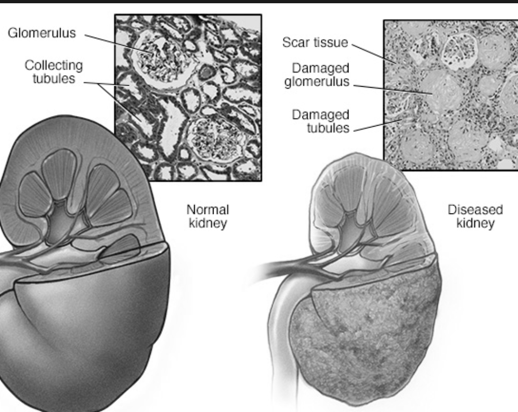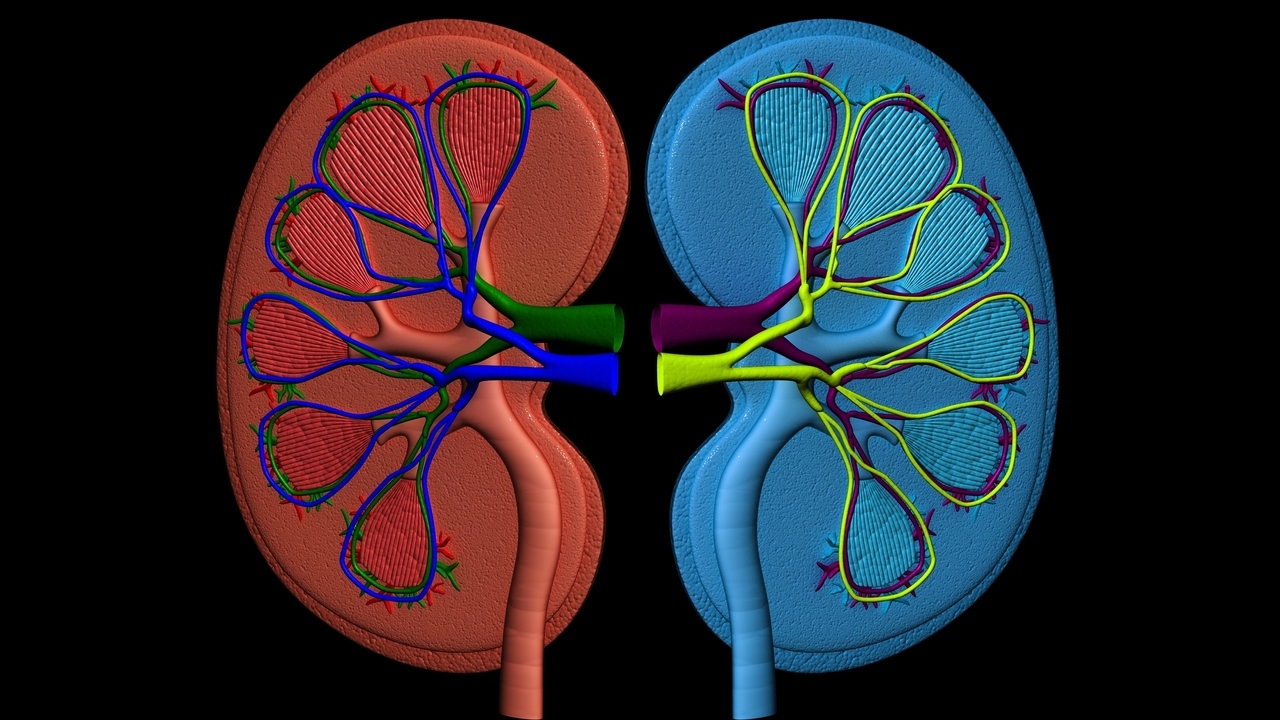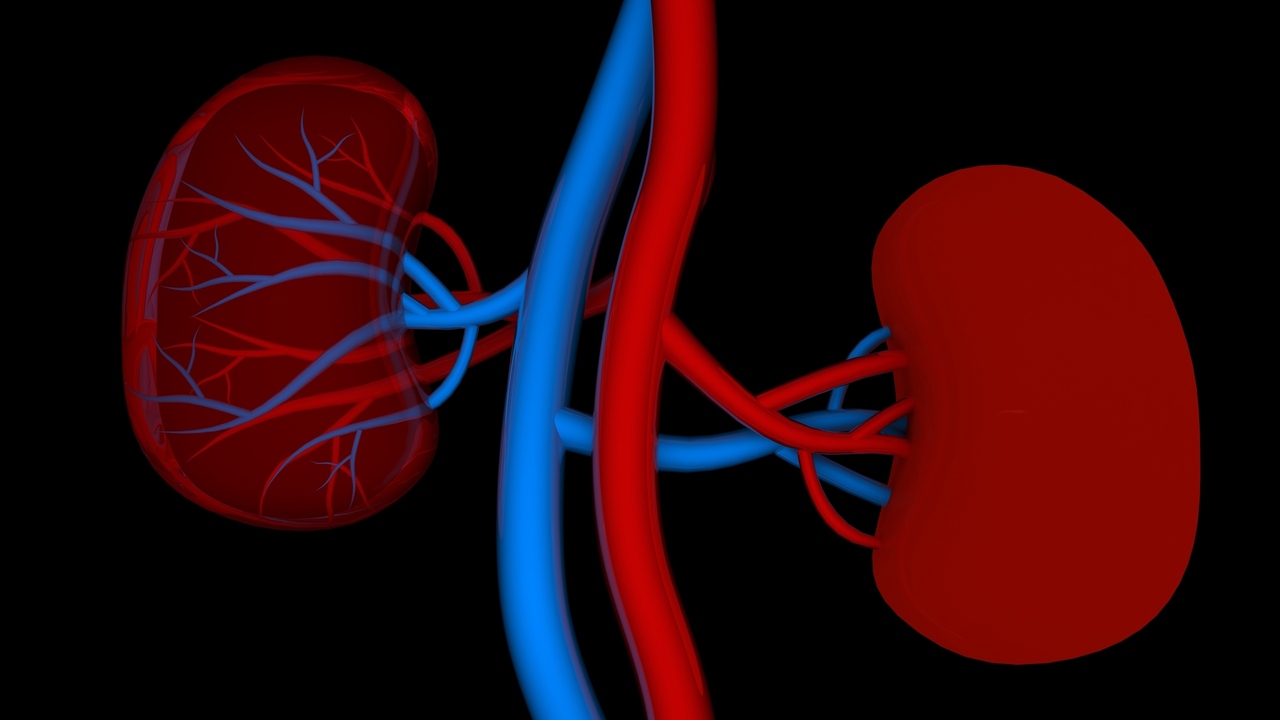
The list of individual drugs that cause kidney damage is so long that it's hard to decide on the top ten. So I've chosen to list them by type of drug: antibiotic, analgesic, etc.
Top ten drugs that cause kidney damage:
1. Antibiotics, including ciprofloxacin, methicillin, vancomycin, sulfonamides.
2. Analgesics, including acetominophen and non-steroidal anti-inflammatory drugs (NSAID): aspirin, ibuprofen, naproxen, and others available only by prescription.
4. Heartburn drugs of the proton pump inhibitor class, including omeprazole (brand name Prilosec), lansoprazole (brand name Prevacid), pantoprazole (brand name Protonix), rabeprazol (brand names Rabecid, Aciphex), esomeprazole (brand names Nexium, Esotrex). See Ref. 4.
5. Antiviral drugs, including acyclovir (brand name Zovirax) used to treat herpes infection, and indinavir and tenofovir, both used to treat HIV.
6. High blood pressure drugs, including captopril (brand name Capoten).
7. Rheumatoid arthritis drugs, including infliximab (brand name Remicade); chloroquine and hydroxychloroquine, which are used to treat malaria and systemic lupus erythematosus as well as rheumatoid arthritis.
8. Lithium, used to treat bipolar disorder.
9. Anticonvulsants, including phenytoin (brand name Dilantin) and trimethadione (brand name Tridione), used to treat seizures and other conditions.
10. Chemotherapy drugs, including interferons, pamidronate, cisplatin, carboplatin, cyclosporine, tacrolimus, quinine, mitomycin C, bevacizumab; and anti-thyroid drugs, including propylthiouracil, used to treat overactive thyroid.
For many prescription drugs, you can find the full prescribing information online. This information is typically 10 – 30 pages long, and includes detailed precautions, warnings, and adverse effects. To find it, do a search for the name of your drug. Find the web site provided by the manufacturer. In most cases, it's just the brand name of the drug with a “.com” added. Then find the link to “prescribing information” and click on that.
For over-the-counter drugs, be sure to observe the precautions on the label. Keep your doctor informed of what you're taking, especially if you have risk factors for kidney disease (see Ref. 2) or other health conditions.
by Linda Fugate, Ph.D.
References:
1. Loh AHL, Cohen AH, “Drug-induced Kidney Disease – Pathology and Current Concepts”, Ann Acad Med Singapore 2009;38:240-50.
2. https://www.empowher.com/news/herarticle/2009/09/02/top-ten-risk-factors-chronic-kidney-disease
3. https://www.empowher.com/news/herarticle/2009/10/26/what-nsaids-do-your-kidneys
4. https://www.empowher.com/news/herarticle/2009/09/09/rare-serious-side-effect-heartburn-drugs
Linda Fugate is a scientist and writer in Austin, Texas. She has a Ph.D. in Physics and an M.S. in Macromolecular Science and Engineering. Her background includes academic and industrial research in materials science. She currently writes song lyrics and health articles.





Add a Comment15 Comments
Hi Anon -
High blood pressure is one of the main contributing factors in developing chronic kidney disease. You can learn more about ckd through the EmpowHER reference page: https://www.empowher.com/media/reference/chronic-renal-failure
While very rare, kidney side effects have been reported from the use of Nexium, including at least two cases of interstitial nephritis. You can learn more here:
http://www.drugs.com/sfx/nexium-side-effects.html
According to another resource this is a very rare side effect, affecting less than 1 in 10,000 people. http://www.netdoctor.co.uk/medicines/100004304.html
Have you been provided with information to assist you with this condition? Have you considered joining a support group? There are a lot of things you can do to help manage ckd and we wish you all the best in doing so.
March 30, 2010 - 6:09pmTake care, Pat
This Comment
Re: Interstitial Nephritis -- I began taking Prilosec in late 2011 for Acid Reflux. 5 months later I was in the hospital with kidney failure - my creatine was 2.98 at admission. I thought I just had some kind of virus, but I wasn't getting better that's when my PCP ordered blood tests and sent me to the emergency room. ER doc said my GFR was 16. Many tests and finally a biopsy confirmed interstitial nephritis. Kidney Doc said - no more Prilosec and I had a horrible withdrawal -- but my body finally adjusted. My kidney function is tested twice a year - Once thru my PCP and once thru the Kidney doc @ Vanderbilt. Creatine just tested again and it's now down to 1.04 - the lowest since 2011. A lot of other things go wrong when your kidney's fail. Vit D deficiency, Anemia - mine was fixed by iron infusions, Parathryoid counts too high requiring I take Calcitriol. Also no longer take any NSAIDS per doc instruction. Anemia was tough on me. Took several months to feel normal again after the iron infusions.
I now take Zantac for Acid Reflux and sometimes do not even need it. Sometimes I wonder about these OTC drugs... My husband and I both used to take a lot of Aleve, Advil. .. now we just take tylenol. We used to have all sorts of aches and pains, but no more. Strange..
December 9, 2014 - 12:43pmThis Comment
Good question. Here's what the Lipitor web site says about excretion: "LIPITOR and its metabolites are eliminated primarily in bile following hepatic and/or extra-hepatic metabolism; however, the drug does
December 31, 2009 - 1:04pmnot appear to undergo enterohepatic recirculation. Mean plasma elimination half-life of LIPITOR in humans is approximately 14 hours, but the halflife of inhibitory activity for HMG-CoA reductase is 20 to 30 hours due to the contribution of active metabolites. Less than 2% of a dose of LIPITOR is recovered in urine following oral administration."
This Comment
Linda,
This is a great list and, like Pat says, is a wonderful reminder to us that these things do interact in our bodies in ways we may not be thinking about.
I was surprised to not see statin drugs on the list? Are they only potentially harmful for the liver?
December 31, 2009 - 8:57amThis Comment
Hi Linda - The long list of drugs that could cause kidney damage is incredible, and a good reminder of our need to be vigilant in understanding the impact of all of the prescription and over the counter drugs we take.
November 2, 2009 - 5:55pmI would just add that our pharmacist, as well as our doctor, can help in understanding and avoiding possible complications from combinations of drugs, both prescriptions and over the counter, and is another source for good information.
Thanks again for this very helpful information!
Best,
Pat
This Comment